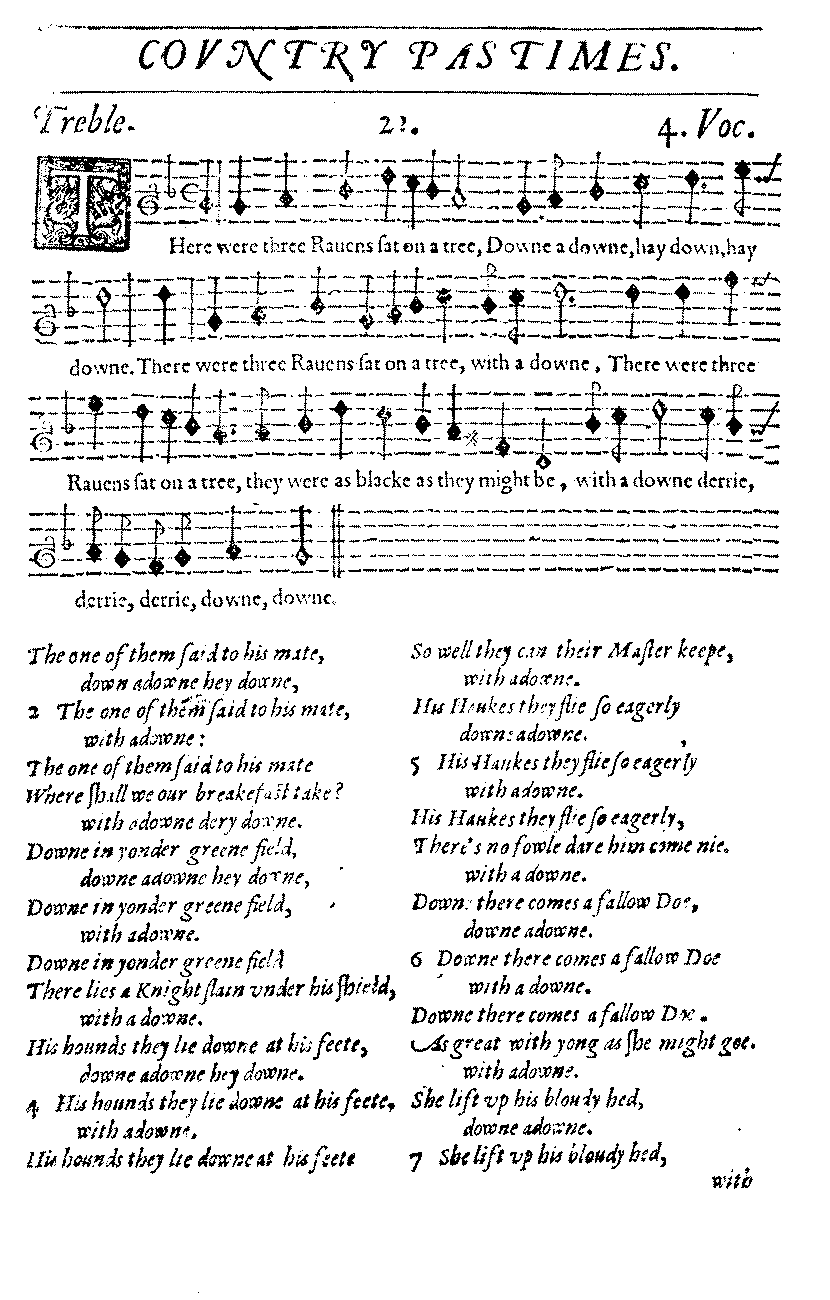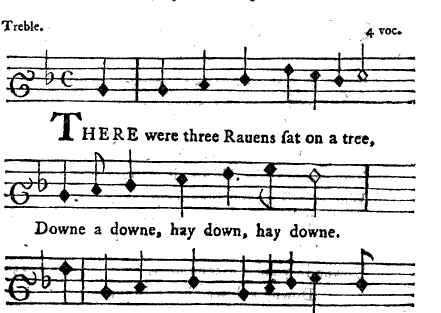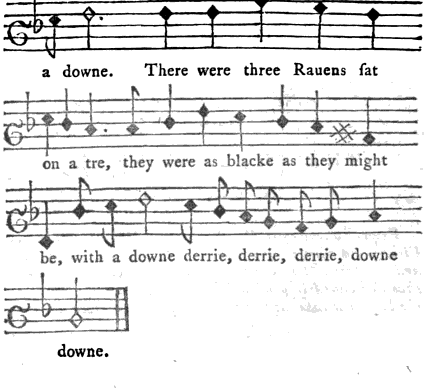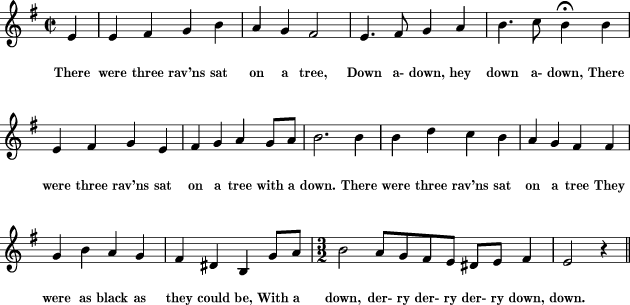The Three Ravens- Ravenscroft; Ritson (London) 1611 Child A a.

Above is a copy of "There Were Three Ravens" from Ravenscroft Melismata, 1611
Thomas Ravenscroft (c. 1582- 1635), English musician, theorist and editor, compiled the Melismata, a collection of British folk music, in 1611. According to Bidgood in his article, The Significance of Thomas Ravenscroft:
"Ravenscroft's three song books', Pammelia (1609), Deuteromelia (1609) and Melismata (1611), are the first collections in English to include any significant material of popular or traditional origin. This makes them an invaluable source for a wide variety of song texts, ranging from what we now call nursery rhymes (Three blinde mice), songs mentioned in contemporary literature (Jacke boy, ho boy newes), Child ballads (Three ravens), Broadside ballads (Yonder comes a courteous knight), and including street cries (New Oysters, new oysters) and a Christmas carol (Remember 0, thou man). It is therefore suprising to find that such important collections have received so little attention."
In 1790, Joseph Ritson published a copy of "There Were Three Ravens" from Ravenscroft Melismata in his Ancient Songs, from the time of Henry VI. to the Revolution. Here's a bio of Ritson from Chambers's Cyclopædia of English literature: Volume 2 - Page 369; Robert Chambers, Robert Carruthers - 1876:
"Joseph Ritson (1752-1803), a zealous literary antiquary and critic, was indefatigable in his labours to illustrate English literature, particularly the neglected ballad-strains of the nation. He published in 1783 a valuable Collection of English Songs; in 1790, Ancient Songs, from the time of Henry VI. to the Revolution; in 1792, Pieces of Ancient Popular Poetry; in 1794, A Collection of Scottish Songs; in 1795, A Collection of all the Ancient Poems, &c. relating to Robin Hood, &c. Ritson was a faithful and acute editor, profoundly versed in literary antiquities, but of a jealous, irritable temper, which kept him in a state of constant warfare with his brother-collectors. He was in diet a strict Pythagorean, and wrote a treatise against the use of animal food. Sir Walter Scott, writing to his friend Mr Ellis in 1803, remarks: 'Poor Ritson is no more. All his vegetable soups and puddings have not been able to avert the evil day, which, I understand, was preceded by madness.' Scott has borne ample testimony to the merits of this unhappy gleaner in the by-paths of literature.
The Three Ravens- Version A a. Child 26 The Three Ravens
a. From Ravenscroft's Melismata. Musicall Phansies. Fitting the Court, Cittie, and Countrey Humours. London, 1611, No 20. [Misprinted 22] [T. Ravenscroft.]
1 There were three rauens sat on a tree,
Downe a downe, hay down, hay downe
There were three rauens sat on a tree,
With a downe
There were three rauens sat on a tree,
They were as blacke as they might be.
With a downe derrie, derrie, derrie, downe, downe
2 The one of them said to his mate,
Downe a downe, hay down, hay downe
The one of them said to his mate,
With a downe
The one of them said to his mate,
'Where shall we our breakefast take?'
With a downe derrie, derrie, derrie, downe, downe
3 'Downe in yonder greene field,
Downe a downe, hay down, hay downe
'Downe in yonder greene field,
With a downe
'Downe in yonder greene field,
There lies a knight slain vnder his shield.
With a downe derrie, derrie, derrie, downe, downe
4 'His hounds they lie downe at his feete,
Downe a downe, hay down, hay downe
'His hounds they lie downe at his feete,
With a downe
'His hounds they lie downe at his feete,
So well they can their master keepe.
With a downe derrie, derrie, derrie, downe, downe
5 'His haukes they flie so eagerly,
Downe a downe, hay down, hay downe
'His haukes they flie so eagerly,
With a downe
'His haukes they flie so eagerly,
There's no fowle dare him come nie.'
With a downe derrie, derrie, derrie, downe, downe
6 Downe there comes a fallow doe,
Downe a downe, hay down, hay downe
Downe there comes a fallow doe,
With a downe
Downe there comes a fallow doe,
As great with yong as she might goe.
With a downe derrie, derrie, derrie, downe, downe
7 She lift vp his bloudy hed,
Downe a downe, hay down, hay downe
She lift vp his bloudy hed,
With a downe
She lift vp his bloudy hed,
And kist his wounds that were so red.
With a downe derrie, derrie, derrie, downe, downe
8 She got him vp vpon her backe,
Downe a downe, hay down, hay downe
She got him vp vpon her backe,
With a downe
She got him vp vpon her backe,
And carried him to earthen lake.
With a downe derrie, derrie, derrie, downe, downe
9 She buried him before the prime,
Downe a downe, hay down, hay downe
She buried him before the prime,
With a downe
She buried him before the prime,
She was dead herselfe ere euen-song time.
With a downe derrie, derrie, derrie, downe, downe
10 God send euery gentleman,
Downe a downe, hay down, hay downe
God send euery gentleman,
With a downe
God send euery gentleman,
Such haukes, such hounds, and such a leman.
With a downe derrie, derrie, derrie, downe, downe
__________________
From: "Ancient Songs from the time of King Henry III. to the Revolution, London, 1790" Page 155
VIII. THE THREE RAVENS
A DIRGE
From Ravencroft's "Melismata. Musicall Phansies. Fitting the Court, Cittie, and Countrey Humours. To 3, 4, and 5. voyces. Lond. 1611." 4/5. It will be obvious, that this ballad is much older, not only than the date of the book, but than most of the other pieces contained in it.

There were three Rauens fat on a tree, with

____________________
Analysis; Translation
Above is the original text of The Three Ravens, which to me is about loyalty. The fallen knight is protected by his hounds, who lie at his feet- his hawks, who protect him from the ravens- no bird can come near. Finally his "fallow doe" which is his "leman" or lover arrives, kisses his wounds and somehow manages to lift him to an "earthen lake" (grave) where she buries him. Either from exhaution or heartbreak, the ordeal is too much for her and she in turn dies.
1. "earthen lake" The Oxford English Dictionary gives several medieval examples of "lake" meaning "pit" or specifically, in at least one case, "grave."
Here's a more modern translation that's been recorded by Richard Dyer-Bennet and appears in Nye's Early English Ballads:
THE THREE RAVENS (More modern lyrics/music)

There were three ravens sat on a tree,
Down a down, hey down, hey down
They were a black as black might be,
With a down.
The one of them said to his mate.
"Where shall we our breakfast take?"
With a down, derry, derry, derry down, down.
Down in yonder green field,
Down a down, hey down, hey down
Their lies a knight slain under his shield,
With a down.
His hounds they lie down at his feet
So well they do their master keep.
With a down, derry, derry, derry down, down.
His hawks they fly so eagerly
Down a down, hey down, hey down
No other fowl dare him come nigh,
With a down.
Down there comes a fallow doe
As heavy with young as she might go.
With a down, derry, derry, derry down, down.
She lifted up his bloody head,
Down a down, hey down, hey down
And kissed his wounds that were so red,
With a down.
She got him up upon her back
And carried him to earthen lake.
With a down, derry, derry, derry down, down.
She buried him before the prime,
Down a down, hey down, hey down
She was dead herself ere even-song time,
With a down.
God send every gentleman
Such hawks, such hounds, and such leman,
With a down, derry, derry, derry down, down.